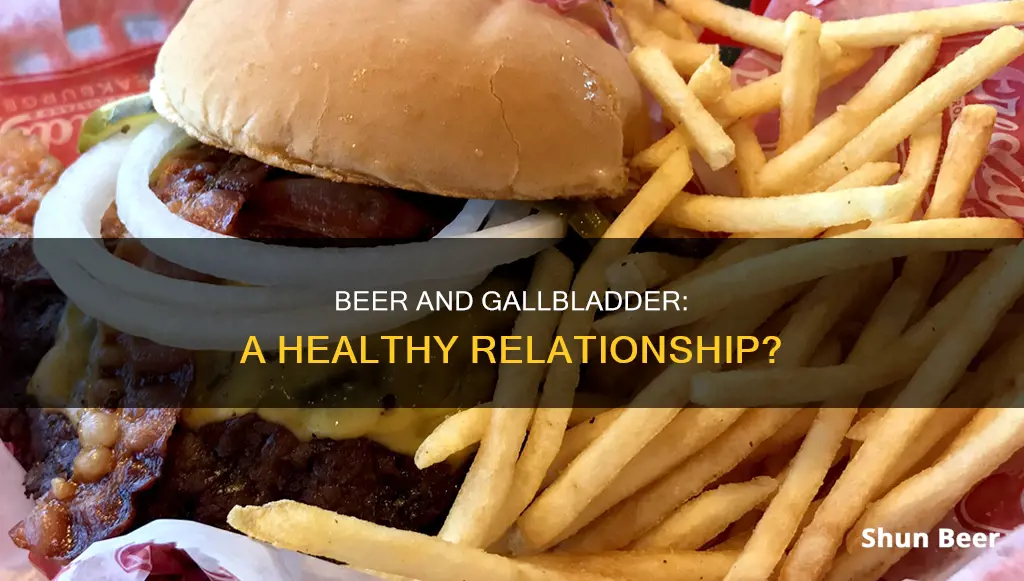
The gallbladder is a small organ located under the liver and above the right rib cage. It is part of the biliary system and plays a crucial role in storing and releasing bile, a substance that aids in the digestion of fats. While consuming alcohol is known to impact the liver, its effects on the gallbladder have been a subject of interest. Research suggests that moderate alcohol consumption may reduce the risk of gallstones, which are a common disorder of the gallbladder. However, excessive alcohol intake is linked to various health issues, including an increased risk of gallbladder cancer. Therefore, understanding the impact of alcohol, specifically beer, on the gallbladder is essential for maintaining overall health.
| Characteristics | Values |
|---|---|
| Can drinking beer help prevent gallstones? | Research suggests that drinking small amounts of alcohol may help reduce the risk of gallstones. |
| How does alcohol reduce gallstone risk? | It is unclear how alcohol reduces gallstone risk. One theory is that alcohol consumption increases the rate at which the gallbladder empties, reducing the amount of bile that lingers in the gallbladder and lowering the risk of stone formation. |
| What is the recommended amount of alcohol consumption? | The Centers for Disease Control and Prevention (CDC) defines moderate alcohol consumption as 1 drink per day for women and 2 drinks per day for men. |
| What are the negative effects of drinking too much alcohol? | Excessive drinking is associated with binge drinking, heavy drinking, and alcohol use disorder. It also increases the risk of various health conditions, including liver disease, heart disease, high blood pressure, stroke, and certain types of cancer. |
| What are gallstones? | Gallstones are lumps of solid material, often cholesterol, that form in the gallbladder. They can vary in size and number and usually take years to grow. |
What You'll Learn

Drinking beer may reduce the risk of gallstones
Research has shown that moderate alcohol consumption may help prevent gallstones. A 2019 analysis of 24 studies on alcohol use and gallstone risk found that alcohol consumption was associated with a decreased likelihood of gallstones. However, the mechanism behind this is unclear. One theory suggests that alcohol increases the rate at which the gallbladder empties, thereby reducing bile stagnation in the gallbladder and lowering the risk of stone formation. However, this has not been supported by research, which has found no difference in gallbladder emptying between drinkers and non-drinkers, or even that alcohol slows down the process. Another theory relates to cholesterol, a common component of gallstones. It is possible that alcohol consumption may lower cholesterol levels in bile, thereby reducing the risk of gallstones.
It is important to note that while moderate alcohol consumption may reduce the risk of gallstones, excessive drinking can have negative health consequences. Heavy drinking is associated with an increased risk of gallbladder cancer, a serious health concern. Additionally, liver problems resulting from excessive alcohol consumption, such as cirrhosis, are linked to gallstones. Therefore, it is crucial to drink in moderation and not exceed the recommended weekly alcohol limits.
Managing High Blood Sugar: Beer's Impact and Your Health
You may want to see also

Heavy drinking can lead to gallbladder cancer
While moderate alcohol consumption may reduce the risk of gallstones, heavy drinking is linked to gallbladder cancer. Alcohol negatively affects the gallbladder in both direct and indirect ways.
Firstly, alcohol reduces bile production, temporarily suppressing bile synthesis. Secondly, chronic heavy drinking can lead to long-term liver damage, further impairing the liver's ability to produce bile. Liver cirrhosis, a serious condition linked to heavy drinking, can also contribute to gallstones.
Research has shown that heavy drinking is associated with an increased risk of gallbladder cancer. A study that pooled data from 26 prospective studies found that current smokers and individuals consuming five or more drinks per day had a higher risk of intrahepatic bile duct cancer. While no association was observed between alcohol consumption and gallbladder cancer in this study, another study that reviewed 24 studies on alcohol use and gallstone risk found that alcohol consumption was linked to a decreased risk of gallstones. However, the negative effects of heavy drinking outweigh any potential benefits.
Heavy drinking is defined as binge drinking on five or more days in the past month. Binge drinking is defined as consuming four or more drinks on the same occasion for women, and five or more drinks for men. Excessive alcohol consumption is associated with an increased risk of various health conditions, including liver disease, heart disease, high blood pressure, stroke, and several types of cancer.
Beer in the Fridge: How Long is Too Long?
You may want to see also

Alcohol negatively impacts gallbladder health
Secondly, alcohol affects bile production, which is crucial for the gallbladder's function. Alcohol reduces bile production when consumed, temporarily suppressing bile synthesis. Additionally, chronic heavy drinking can lead to long-term liver damage, further impairing the liver's ability to produce bile over an extended period. This can have detrimental effects on the gallbladder, as bile plays a central role in fat digestion and the absorption of fat-soluble vitamins.
Thirdly, liver problems resulting from heavy alcohol use, such as cirrhosis, are linked to gallstones. About a third of people with cirrhosis develop gallstones due to complications from liver scarring. Therefore, alcohol's impact on the liver can indirectly contribute to gallstone formation and subsequent gallbladder issues.
Finally, if acute pancreatitis is caused by gallstones, alcohol consumption can exacerbate the problem. Alcohol can cause inflammation of the pancreas (pancreatitis), leading to severe abdominal pain and vomiting. This highlights how alcohol can negatively impact the gallbladder indirectly by affecting other organs in the biliary system.
In conclusion, while moderate alcohol consumption may not directly cause gallstones, heavy drinking is associated with an increased risk of gallbladder cancer and other health issues. Alcohol's impact on bile production, the liver, and pancreatitis can all negatively affect the gallbladder and its function. Therefore, it is essential to drink in moderation or avoid alcohol altogether to maintain optimal gallbladder health.
Parked, Drinking Beer: Legal or Not?
You may want to see also

Alcohol reduces bile production
Bile is a yellow-green fluid produced by the liver. It is collected and stored in the gallbladder and released into the intestine to aid digestion. Bile contains water, cholesterol, phospholipids, waste products for excretion (such as bilirubin), and chemicals that aid digestion (bile acids). It helps break down fat from food and enables the body to absorb fat-soluble vitamins A, D, E, and K.
The gallbladder is a small, pear-shaped organ located under the liver and below the right rib cage. While moderate alcohol consumption may reduce the risk of gallstones, heavy drinking is linked to an increased risk of gallbladder cancer and other health issues. Therefore, it is important to drink in moderation or avoid alcohol altogether to maintain a healthy gallbladder and liver.
Research has shown that alcohol consumption is associated with a decreased risk of gallstones. However, the mechanism behind this is not yet fully understood. One theory suggests that alcohol may increase the rate at which the gallbladder empties, reducing the amount of bile lingering in the gallbladder and lowering the risk of stone formation. Nevertheless, other studies have found no difference in gallbladder emptying between drinkers and non-drinkers, or even that alcohol slows down the process.
Beer Blues: Bad Brews Make You Sick?
You may want to see also

Drinking beer may increase the rate at which the gallbladder empties
Drinking beer in moderation may help prevent gallstones by increasing the rate at which the gallbladder empties. However, it's important to note that excessive alcohol consumption can negatively impact gallbladder health and increase the risk of gallbladder cancer.
The gallbladder is a small, pear-shaped organ located below the liver and connected to the intestine and liver by bile ducts. It is responsible for storing bile, a substance that aids in the digestion of fats. Gallstones are a common disorder of the gallbladder, affecting 10-15% of people in the United States. They are formed from cholesterol and bile that has hardened and can cause pain, nausea, and vomiting.
While the exact mechanism is unknown, one theory suggests that alcohol consumption may increase the rate at which the gallbladder empties. This would reduce the amount of bile lingering in the gallbladder, thereby lowering the risk of gallstone formation. However, other research has not supported this finding, and some studies have observed no difference in gallbladder emptying between drinkers and non-drinkers, or even a slowing of gallbladder emptying in drinkers.
It is important to note that while moderate alcohol consumption may reduce the risk of gallstones, heavy drinking is linked to other gallbladder problems, including cancer of the gallbladder. Therefore, it is generally recommended to drink in moderation or avoid alcohol altogether to maintain optimal gallbladder health.
Additionally, it is worth mentioning that maintaining a healthy weight and a diet low in saturated fats and high in fresh fruits, vegetables, and whole grains can also help reduce the risk of gallstones.
Beer on the NYC Subway: What's Allowed?
You may want to see also
Frequently asked questions
Research suggests that moderate alcohol consumption may help prevent gallstones, but it is not clear how this happens. Heavy drinking is linked to other gallbladder problems, including cancer of the gallbladder.
The gallbladder is a small organ located directly below the liver. Its function is to store bile, a substance that helps break down and digest fat.
Gallstones are lumps of solid material that form in the gallbladder. They are usually small stones or gravel, but can vary in size. They may take years to grow and there may be one or several.
Many people live with gallstones without symptoms. The most common symptom is pain in the abdomen, known as biliary colic, which can vary from mild to severe. Other symptoms include nausea, vomiting or excessive sweating.
To keep your gallbladder healthy, you can increase your fibre intake, eat more healthy fats, cut back on saturated fats, sugars and refined carbohydrates, and get regular exercise.







